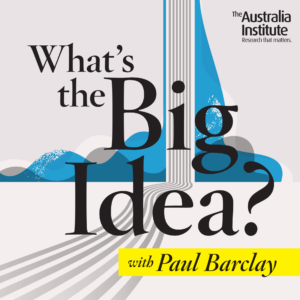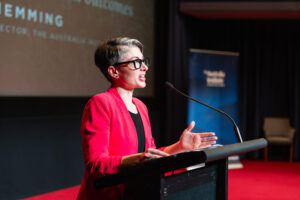While last year’s robodebt royal commission exposed a shocking lack of ethics among senior ranks of the Australian public service, the systemic condition still largely seems to be regarded as an aberration.
It is a perfect storm, culminating from what Commissioner Catherine Holmes called “an ill-conceived, embryonic idea”. It may have been an ill-conceived embryo, but it was deliberately nourished – fed on what Holmes described as “venality, incompetence and cowardice” by politicians, ministerial staff and senior public servants to pursue a political objective.
Australia’s climate and environment policies are characterised by, and nourished on, a strikingly similar diet. This is not to diminish the seriousness or tragedy of robodebt. It is to highlight that, while undoubtedly an extreme sequence of events, the behaviour behind it was not anomalous.
Robodebt was five years of lies, mistakes and failures. Australia’s climate policy is entering decades of the same, under the watch of both major political parties and their enablers. An aggressive and longstanding protection scheme for the fossil fuel industry run by successive governments has given Australia the dubious honour of being one of the world’s largest exporters of climate change. Our little nation state is a notorious long-term blocker of international climate ambition and has played a key role in slowing global action. Climate change is already costing lives both here in Australia and abroad.
The science linking fossil fuels to climate change has been clear for almost 50 years, as have the predicted impacts of climate change. It gets clearer every year. No one working in, or for, government can claim they don’t know what they are part of now.
The severity of the Black Summer bushfires of 2019–20 was unequivocally linked to Australia’s changing climate, and resulted in the deaths of around 500 people and three billion animals. In February 2022, floods on the east coast claimed 23 lives. The torrential storms and flash flooding over last Christmas claimed 10 lives. Extreme heat has caused more deaths in Australia than any other natural hazard.
These are the direct effects of climate change. Indirect effects include increased prevalence of infectious diseases, heat stress and mental health impacts. Then there is the financial burden: the increased cost of living, supply chain disruption and entire regions becoming uninsurable.
And as Australia continues to subsidise fossil fuel expansion, very little is being spent to adapt or recover from existing climate impacts, to say nothing of what we know lies ahead. None of us is immune to these catastrophic impacts, though it’s no surprise that First Nations communities and disadvantaged groups will suffer the most.
The causal nexus between executive government and climate change may be less visible than it was with robodebt, but it is there. A damning body of evidence dating back to at least the early 1990s documents how Australian politicians – with the help of senior public servants – have ignored the science, undermined international climate negotiations, watered down United Nations climate reports, pandered to the resources industry, pursued long-term markets for Australia’s gas and coal, thrown billions of dollars at false solutions, commissioned dodgy modelling, sabotaged the ambition of other countries and twisted logic into unrecognisable forms in order to justify it all.
The legacy left by Coalition governments is shameful: recently released cabinet documents show that industry snuffed out political appetite for an emissions trading scheme back in 2003. But future cabinet documents will show Labor governments and their departmental facilitators are far from innocent.
Australian governments have carried out some truly heinous acts – removing Aboriginal children from their parents, lying about children being thrown overboard, sending the army into Aboriginal communities, spying on developing countries, unlawfully invading Iraq, illegally locking up refugees – and are now in the process of orchestrating and overseeing systemic ecosystem collapse. All of it aided in some way by the federal government’s “senior executive”: departmental secretaries, deputy secretaries, and division and branch heads.
While there are undoubtedly senior public servants maintaining a noble agenda, salary packages ranging from several hundred thousand dollars to well over a million must also be a welcome salve to bureaucrats morally conflicted over their roles in such clear atrocities. It’s hard to recall any ever coming out publicly and saying “enough”.
Robodebt ensured Labor made integrity a central part of its 2022 election platform. And in fairness, the Albanese government has initiated a comprehensive public-sector reform agenda including measures designed to rein in the senior executive. Public Service Minister Katy Gallagher has conceded that, under the Coalition, “the public service became more like an administrative service to ministers”. What is unclear, however, is whether the government has the appetite to cut the Gordian knot tethering it to the senior executive, considering how much it benefits from the status quo.
Nowhere is the federal government’s rhetorical commitment to integrity at greater odds with its political agenda than in its approach to the climate and biodiversity crises. The Albanese government’s policy toolkit is almost indistinguishable from the Coalition’s: the safeguard mechanism, the nature repair market, Australia’s carbon offset scheme, gas industry expansion, stacking “independent” agencies with industry interests. So where is the incentive to dismantle the executive architecture propping it up?
The administration and implementation of Australia’s climate and environment policies is the true test for the government’s appetite for genuine integrity and public sector reform. A test it is already failing.
While the science says that to keep within the physical bounds of a liveable planet there can be no new fossil fuel projects, the federal government has approved multiple projects, with many more to come. The government spends more than $9 billion in fossil fuel subsidies every year – $1.5 billion was committed to a single gas project in the Northern Territory. Legislation is being passed as a favour to gas companies, as demonstrated by Labor’s recent sea dumping bill.
The narrative from the government and relevant departments is that if Australia stopped selling gas and coal to our major trading partners it would cause energy system chaos and lead to complete security breakdown in the Indo-Pacific. Meanwhile we’re told the best way to protect and restore Australia’s collapsing ecosystems is to leave it to market forces. To be clear, none of this is true.
Secrecy, brazen conflicts of interest and/or partisan appointments are features of all the Albanese government’s climate- and environment-related bodies and processes. The Climate Change Authority, the Independent Review of Australian Carbon Credit Units, the Net Zero Economy Agency, the National Reconstruction Fund Corporation, the Nature Finance Council, and the Environment Protection and Biodiversity Conservation Act consultation… not one of these initiatives embodies the accountability or transparency the government promised.
One only has to do a quick news search or watch a few minutes of Senate estimates to see that senior executives from Australia’s climate agencies – many of whom have served under previous Labor and Coalition governments – are still retrofitting advice and crafting spin to uphold the political agenda. It is rumoured that long-term executives working in the Albanese government’s climate portfolio have been known to refer to themselves as the “climate mafia”.
Last year, Jo Evans, a deputy secretary from the Department of Climate Change, Energy, the Environment and Water, told Senate estimates that “we are already pushing our emissions reduction to go as fast as is possible”. This is despite emissions in Australia increasing over the past 18 months and the government approving new gas projects and coalmines – the opposite of reducing emissions as fast as possible. In 2019, Evans suggested to an incredulous Senate committee that climate change would actually be an advantage to some countries.
The Australian Public Service code of conduct says public servants have a duty to practise “the highest standards of ethical behaviour”. Whether in estimates or elsewhere, any executive with the most homeopathic regard for the public service values – accountability, impartiality, and providing advice that is “frank, honest, timely and based on the best available evidence” – would have to admit that the government’s approach to the climate and biodiversity crises is not only unscientific, it’s an economic bin fire.
But they don’t.
In 2021, Evans gave testimony to the Administrative Appeals Tribunal that political infighting had effectively made it impossible to give frank and fearless advice to politicians on climate change. After the Black Summer bushfires, several former senior public servants broke their silence and expressed anger over the failure of Australian governments to tackle climate change. None felt the need to break their silence while on their generous pay packets. None except Penny Sackett, the former chief scientist, acknowledged their own roles in maintaining the status quo.
Retrospective bravery is not bravery. While many suggest those in the senior executive are products, if not victims, of the corporatisation of the public sector, we cannot keep excusing them as “just following orders” or “doing their best in a broken system”. When it comes to climate policy, the senior executive is the broken system. Demonstrating the “highest standards of ethical behaviour” means protecting the broader public service as an institution and putting the interests of the Australian community first.
We are not only in a climate crisis. We are in a morality crisis. It is true that Australia’s laws and governance are not equipped to deal with the decision-making or spin that exacerbates climate change or ignores its risks. There is nothing binding in federal legislation that requires those in the senior executive to consider the climate impact of their advice or their silence. That doesn’t excuse them.
It is not the job of the senior executive to determine climate policy or the way we treat vulnerable welfare recipients. Those are decisions for our parliaments and our courts. At the same time, it is also not the job to of the senior executive to disseminate propaganda or retrofit policy advice to suit a political agenda. The consequences of continued fossil fuel expansion are clear, which is more than can be said about the consciences of those being paid handsomely to make the indefensible seem unavoidable.
History will not look kindly on those complicit in facilitating a fossil fuel agenda, even if they haven’t technically broken any laws. Lives and species will be lost as a result of the actions of Australian governments and the bureaucracy. At some point they must be called out.
Morality aside, there are existing mechanisms that should already hold senior executives to account, even in the corporatised, privatised state of the public service. But such mechanisms are insufficient when ministers clearly have no interest in upholding legislation designed to prevent conflicts of interest, compel robust advice, and provide information to the public in a timely manner.
The 2022 election result was a vote for climate action and integrity. After the hottest year on record, we are now closer to the next election than the last, and the public is still waiting to get what it voted for. The government can make a show of tinkering at public sector reform, or it can bring new ideas, new institutions and new resolve to prove to voters that it is acting on climate with integrity.
The fact is, there is nothing groundbreaking in what is required to stop a repeat of robodebt or to adequately respond to the climate crisis. Robust whistleblower protections, an end to “jobs for mates”, non-obstructive freedom of information practices and the expedited release of cabinet documents, while not exhaustive, would be an effective start.
The simplest and most effective solution would be for the government itself to just start acting in the public interest. The scandals and egregious behaviour by the senior executive arise predominantly in those agencies pushing government policies that clearly are not in the public interest. Though perhaps that is wishful thinking given that, even amid Labor’s integrity reforms, Attorney-General Mark Dreyfus is trying to criminalise disclosure of information by public servants that “undermines public trust in government” – despite there being few things that scream “don’t trust government” louder than punitive secrecy laws.
It is often said that corruption thrives in the dark. Grey corruption – the questionable behaviour and decision-making that doesn’t pass the pub test but is not captured by the law – breeds in the shadowy margins.
As we are seeing with climate change, it is the grey corruption that often does the most damage. In contrast, democracy thrives in openness and light. It must be nurtured. Now more than ever, we need a government and a senior executive demonstrably committed to being its caretaker.
Between the Lines Newsletter
The biggest stories and the best analysis from the team at the Australia Institute, delivered to your inbox every fortnight.
You might also like
We need political courage, not caution | Polly Hemming
When it comes to solving the biggest national problems, a bit of courage leaves political caution for dead. Now’s not the time for politeness.
Integrity at home shapes global outcomes – Polly Hemming | Climate Integrity Summit 2025
Despite frequent claims that Australia is ‘too small to make a difference,’ historical evidence demonstrates our nation’s outsized role in influencing international norms and policies.
Now is the time for brave reform
A housing crisis, accelerating climate change and widening inequality all confront the re-elected Albanese Government, but the solutions exist (and often aren’t that complicated).




